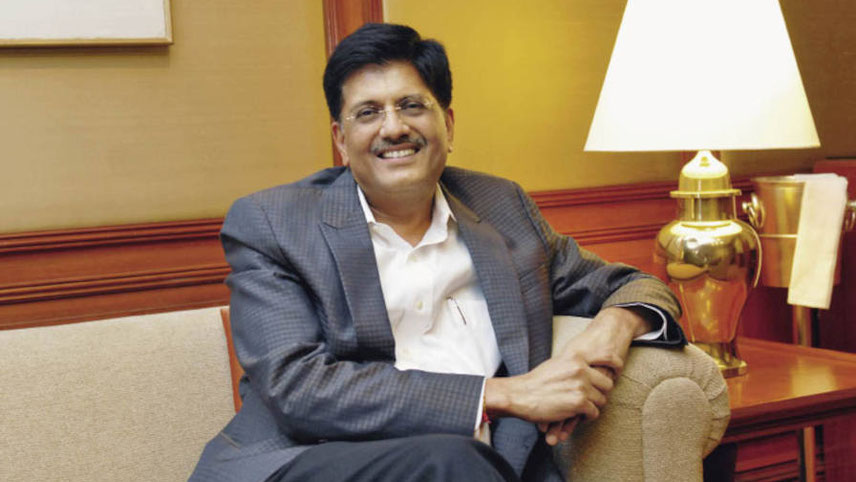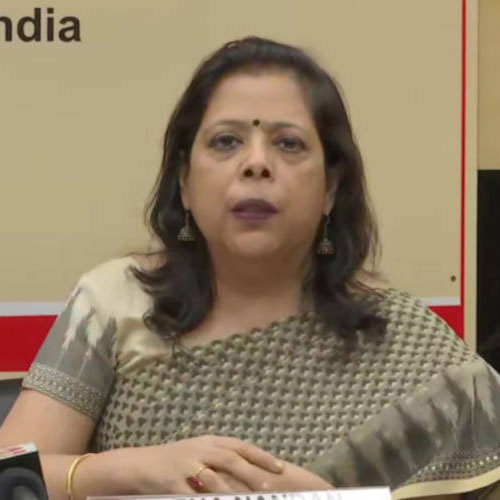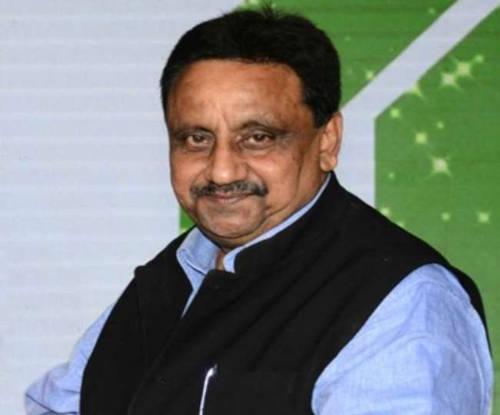-

Goyal: isolated within the government; Photo: Sanjay Borade
Goyal, of course, now maintains “strong feedback” will help in preparing a robust e-commerce policy even as he termed reports of differences within the government on the proposed policy as efforts to “sensationalise any feedback”.
Upward trajectory
The Indian e-commerce industry has been on an upward growth trajectory and is expected to surpass the US to become the second largest e-commerce market in the world by 2034. The sector will reach $99 billion by 2024 from $30 billion in 2019, expanding at a 27 per cent CAGR, with grocery and fashion/apparel likely to be the key drivers of incremental growth. Just the online grocery market is estimated to reach $18 billion in 2024 from $1.9 billion in 2019, expanding at a CAGR of 57 per cent.
According to Forrester Research, Indian e-commerce sales rose by 8 per cent in 2020. The lockdown and other Covid protocol restrictions that followed forced many shoppers to go online. With such high stakes involved, the draft rules were clearly destined to go out of the window.
Hence it came as a surprise when Goyal seemingly shot off his mouth. Goyal’s comments on Tata came after media reports that the conglomerate was among most vociferous in telling the government in a July meeting that the proposed e-commerce rules will have a major impact on its business and bar its joint venture partners like Starbucks from selling goods on Tata’s shopping websites. At the CII event, Goyal said Tata’s objection to the rules had hurt him, saying he had conveyed that position to N. Chandrasekaran, chairman, Tata Sons.
In the past, the minister had also criticised Amazon and Walmart’s Flipkart for allegedly bypassing foreign investment rules for e-commerce. Recently, he also invoked the “Quit India” movement in Parliament as he welcomed a court order that allowed an antitrust probe of the two companies to continue. This is almost akin to RSS-affiliated magazine Panchajanya’s description of Amazon as another “East India company 2.0” which followed.
Interplay of politics, diplomacy
Evidence of the strong dissonance within the government over the draft e-commerce rules and the interplay of domestic politics and diplomacy is now coming to light with the finance ministry describing some proposals as “excessive” and “without economic rationale”. A memo from the finance ministry’s Department of Economic Affairs on 31 August said the rules appeared “excessive” and would hit a sector that could boost job creation as well as tax revenue. “The proposed amendments are likely to have significant implications/restrictions on a sunrise sector and ‘ease of doing business’,” said the three-page memo. “Care needs to be taken to ensure that the proposed measures remain ‘light-touch regulations’.”
Interestingly, the arguments put forth by the finance ministry (and NITI Aayog) are in line with concerns raised by sector operators, and more importantly the US government. They say New Delhi has in recent years changed e-commerce policies too often and taken a hard-line regulatory approach that especially hurts American players. It is not a coincidence that the repudiation of the e-commerce draft rules came on the eve of Prime Minister Narendra Modi’s visit to the US.
-

Nandan: soothing the frayed ministerial nerves
NITI Aayog steps in
Records obtained by The Indian Express under the Right to Information (RTI) Act show that key provisions of the draft rules were stridently opposed by the Industry department and Corporate Affairs ministry – and the Niti Aayog vice chairman Rajiv Kumar who has warned that they “will severely harm Ease of Doing Business and impact small businesses.” The DPIIT has flagged several anomalies, questioned some provisions and suggested remedial tweaks in an office memorandum sent to the Consumer Affairs Department.
One of the issues making businesses and government departments nervous is “fall back liability,” which makes e-commerce liable to compensate the consumer if the seller registered with the entity fails to deliver the goods or services exactly in the way described on the platform. Many have demanded that it should be done away with. “The concept of fall back liability should be done away with because it dilutes the intermediary safe harbour under the provisions of the IT Act as well as the arm’s length requirements provided under the FDI policy,” says industry body Internet and Mobile Association of India. Official sources concede the “fall back liability” will be in conflict with the intermediary safe harbour clause of the IT Act – a case of the left arm (in the government) now knowing what the right one is doing.
Key divergences
Apart from “fall back liability”, a key portion of the draft that has come under fire from within the government are the changes proposed under “duties of sellers on marketplace, inventory e-commerce entities”. In its office memorandum, dated 18 July, the DPIIT said: “The concept of ‘fall back liability’ may be examined in view of Product Liability provision as per Section 2(34) and Chapter VI of the Consumer Protection Act 2019.
It may be evaluated if introduction of a new concept of ‘fall back liability’ is necessary in view of existing legal provisions. The definitions of Cross Selling, Miss-selling and Flash Sale may be re-examined. These concepts are addressed under the ethical and responsible e-commerce. It may be examined whether introduction of these new concepts is required”.
According to the Consumer Protection Act, 2019, product liability is defined as “the responsibility of a product manufacturer or product seller, of any product or service, to compensate for any harm caused to a consumer by such defective product manufactured or sold or by deficiency in services”.
This, along with the Chapter VI of the Consumer Protection Act, lays the responsibility of the defective product on the seller or the manufacturer. However, the proposed e-commerce rules, which are being notified as part of the Consumer Protection Act, make online marketplaces responsible for any shortcoming in products delivered through their platforms.
Questioning FDI policy
Industry players have also pointed out that while the FDI policy prohibits companies such as Amazon and Flipkart from having control over inventory sold on their platforms, the e-commerce draft rules holds these platforms liable in case a seller fails to deliver goods or services due to negligent conduct, which causes loss to the customer.
The DPIIT has suggested that duties of sellers on marketplace, inventory e-commerce entities may be aligned with the framework in Draft National e-Commerce Policy. “The objective is to prevent sellers from engaging in any type of activities that result into market distortion,” it noted.
The DPIIT has also called into question the outright banning of flash sales which limits consumer choices. The department feels that concepts such as cross-selling, mis-selling and flash sales “are addressed under the ethical and responsible e-commerce”. In addition, the DPIIT has called for start-ups and MSMEs to be exempted from compliance of the new e-commerce rules.
-

Khandelwal: not happy with Niti Aayog
Forum shopping
The Ministry of Corporate Affairs, in an office memorandum dated 22 July pointed out the overlap between some of the proposed provisions and the Competition Act. It has said that as a result of these provisions “consumers may be prompted… to bring cases of abusive conduct against dominant enterprises before consumer fora…”.
“This will create a fertile ground for forum shopping besides regulatory overlaps, thereby resulting into a potential scenario of divergent rulings,” it added.
Niti Aayog has also echoed concerns of overlap with existing laws and regulations. In a 14 July memo, Niti Aayog said: “The proposal restricting the listing of related parties on e-commerce platforms appears to be a case of overreach.” Separately, Rajiv Kumar, vice chairman, NITI Aayog, wrote in his letter to Goyal: “In the post pandemic recovery period, it is necessary to give a major impetus to MSMEs, small businesses through e-commerce utilising the strength of digital India. The draft Rules would adversely impact the recovery rate”.
Experts weigh in
Market experts point out that it is ironic that the definition of e-commerce entity under the draft rules does not make a distinction between FDI and non-FDI marketplace, which seemed to have been the main driving agenda behind the new regulations. These experts feel that the new rules will lead to a chaotic situation as many provisions are in contrast with, or replicate provisions of other existing laws that are already in force and under jurisdictional purview of other regulators. Several proposals go beyond the scope of the consumer affairs ministry’s rule-making powers under the Consumer Protection Act.
The rules pertaining to the ability of a marketplace entity to provide support services to sellers have already been set out in Press Note 2 of the FDI rules which allow e-commerce companies to provide ancillary services such as warehousing, order fulfilment, logistics and payment collection. The Press Note already imposes a restriction on sellers listed on a marketplace to buy a maximum of 25 per cent of its inventory from a related party of the marketplace entity.
Further, a wholesale entity is permitted to sell goods to any B2B entity in India, subject to restrictions, and general KYC requirements applicable to its business. Traditionally, the provision of services simplicitor, whether on B2C or B2B basis, is expressly and historically permitted under FDI under 100 per cent automatic route.
In terms of compliance officers assisting law-enforcement agencies, the IT Act already mandates the appointment of officers to help with responses to the government, for responses to cyber security incidents. The data-sharing mandate under the draft rules has already been proposed to be regulated under the upcoming Personal Data Protection Bill, 2019.
-

Kumar: draft rule will affect business
Compliance burden
India already has a robust and comprehensive set of laws/regulations to deal with most facets of business envisaged by the draft consumer protection e-commerce rules. Experts fear that if the draft rules are implemented, it will only add a layer of compliances and mandatory procedures which will ultimately have a telling effect on Ease of Doing Business.
Then there is the issue of the signals that are going out. In the last few years, the Modi government has been taking steps to regulate the policy environment. Initially, social media companies came under intense scrutiny from the government, which was quickly followed by a set of rules that sought to regulate such companies. The government then focused its attention on the media. Now, the government is looking to regulate e-commerce companies.
The draft rules, if implemented, will take us back decades. In the last 30 years, India has also developed a robust legal and judicial framework. India needs to implement the existing laws to uphold competitive business while also protecting the consumer and small businesses, not bring in new rules to please influential political lobbies. Clearly, a decent burial for the draft rules will settle the matter.






































